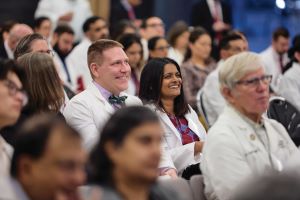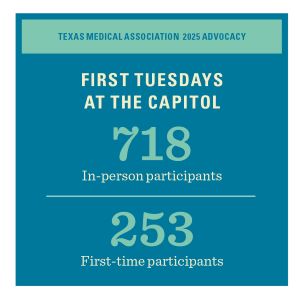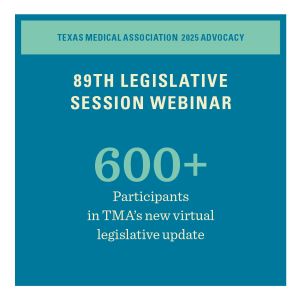
During a uniquely fast-paced and unpredictable state legislative session, the Texas Medical Association remained a powerful force for medicine and Texas physicians who, in turn, showed up in record numbers to remind lawmakers meaningful health care reform begins with those who deliver it.
The result: Multiple pro-medicine pieces of legislation passed, and even more harmful bills defeated – victories due in no small part to TMA’s grassroots advocacy.
Preventing scope of practice creep was the “largest win for TMA this session,” said G. Ray Callas, MD, the association’s president for much of the 2025 legislative session.
The victory was one of many TMA secured this session among its legislative priorities to advance access to care, support practice viability, and preserve physician autonomy.
As chair of TMA’s Council on Legislation, Zeke Silva, MD, was in a unique position to witness the direct impact of medicine’s advocacy as hundreds of physicians visited the Texas Capitol throughout the session. (See “Inside the Capitol,” page 6.)
“That’s always been and always will be our differentiator: When [TMA comes] to the table, everyone in that room and everyone in that building knows who we represent, and that’s physicians,” the San Antonio radiologist said.
Dallas oncologist David Gerber, MD, is living proof of that principle. Two years ago, he began testifying to Texas legislators that information-blocking provisions stemming from federal law had allowed patients to view potentially life-changing test results before their physicians had time to deliver or clarify the news.
With TMA’s support, Dr. Gerber proposed a measure permitting a pause in Texas that cleared the 2023 Texas Legislature – but fell victim to a last-minute veto. Dr. Gerber knew, however, TMA’s robust team of lobbyists, attorneys, and health information technology specialists were ready to try again – and returned this year with a new bill that won Texas medicine its first victory of the 2025 session.
TMA’s doubling down both sessions to protect patients in the face of rising electronic communication was “nothing short of remarkable,” Dr. Gerber said.
“As someone who was not previously legislatively active, I just assumed the gears always moved slowly, if they moved at all,” he said. “TMA proved me wrong. TMA’s team of lobbyists and professionals were nimble, responsive, and supportive. I loved my days down there with them.”
Reinforcing relationships
Rep. Suleman Lalani, MD (D-Sugar Land), said he felt similar energy from TMA this session, describing the association and his relationship with it as “grounding” and “engaging.”
Representative Lalani is one of many lawmakers TMA has facilitated a positive relationship with over the years – an essential practice that helps the association and its members bolster medicine’s visibility at the Texas Capitol.
Dr. Callas says TMA worked harder than ever before this year to maintain those relationships. During his presidential term, Dr. Callas himself spent many days visiting legislators on TMA’s behalf.
“I was working with some legislators with whom I never believed I’d be working,” he said. “We built coalitions with legislators that we’ve never had before, and it’s going to pay off in the long run.”
These coalitions – established through one-on-one meetings during TMA advocacy events like First Tuesdays at the Capitol and via communication from physicians eager to share their insight on health care legislation – are reinforced when Texas physicians support lawmakers’ efforts by testifying on their bills or against harmful ones, Representative Lalani says.

Tilden Childs, MD, explained to Texas Medicine after testifying in February why a show of force by physicians during First Tuesdays is so important. This session’s First Tuesdays drew a record number of Texas physicians, and the new virtual presentations held the night before provided timely information on specific actions TMA took during the session.
“If you’re not here to tell your story, someone else will tell a different story,” the immediate past chair of TMA’s Council on Legislation said.
At each of the four First Tuesdays events this year, TMA hosted legislators to speak about the importance of physicians’ involvement in policymaking and the legislative process.
“When you talk to legislators, make it clear that you’re here to protect the medical care of Texans,” Sen. Donna Campbell, MD (R-New Braunfels), said as she ended her fiery speech to attendants of May’s First Tuesdays reception.
Hundreds of Texas physicians responded to that call this year, garnering praise from Representative Lalani on the House floor during TMA’s First Tuesdays event in April.
“These [physicians] have been walking in the halls of the Capitol, advocating for issues that impact the medical community, but also all Texans across the state,” Representative Lalani said. “These physicians are on the front lines of medicine, and their voice is critical in shaping the policies that affect public health, medical education, and access to care.”
This year’s legislative session drew a remarkable and record number of physicians who testified, including some for the first time, like Odessa allergist Vivek Rao, MD. He added his voice to medicine’s collective outcry this year after legislation threatening to expand nurses’ scope of practice began gaining traction among legislators.
Although initially hesitant to testify, he said TMA staff helped him “every step of the way,” from drafting written testimony to formulating and fine-tuning his in-person statements.
“It is important to let legislators know how some of these bills can impact the public,” said Dr. Rao, who sits on TMA’s Council on Legislation. “Through testimony, physicians can directly provide medical information to legislators and serve as a cornerstone of truth amid rampant misinformation.”

Medical advocacy doesn’t always begin at the Capitol. Dr. Gerber’s journey into health care activism began after physicians in Kentucky asked for help crafting sensitive test result legislation in the state – and after Dr. Gerber’s Dallas County Medical Society colleagues encouraged him to reach out to TMA to do the same in Texas.
“It’s when you bring people together that you really make an impactful difference,” Dr. Gerber said.
TMA works in tandem with Texas’ 110 county medical societies – often where physicians first become acquainted with regional or specialty health care issues that play into state and federal legislation – to advance its lawmaking goals.
Brian Swift, Tarrant County Medical Society executive vice president, adds that strong connection between TMA and local societies is fostered by the work of the TMA Alliance, which founded First Tuesdays in 2003.
“TMA and county medical societies are a united force. We are fervent about protecting the future of medicine,” Mr. Swift said. “But of course, you cannot forget about the TMA Alliance. Without them, we’d be working twice as hard without half of the results.”
Well-educated and well-prepared with information from new CME-eligible legislative webinars and briefings and TMA position flyers handed out at First Tuesdays, Texas physicians conveyed to lawmakers the realities they knew from firsthand experience, whether patient safety concerns with scope-of-practice expansions or public health hazards of a measles outbreak.
For instance, more than 30 Texas physicians testified in person on April 14 against the first major scope expansion bill to drop during session, House Bill 3794, and close to 200 others testified online or responded to TMA’s related action alert with messages sent directly to their local lawmakers by email or phone.
The sea of white coats surged even higher just two weeks later on May 1, when more than 60 physicians from around the state again trekked to the Capitol to oppose second proposed major scope bill, Senate Bill 3055, alongside nearly 300 peers who either submitted written testimony or responded to TMA’s action alert. Each of those hearings marked the largest testimony turnout TMA had rallied on a particular bill.

Another bill TMA considered would undermine the Texas Medical Board. It was such a threat to patient safety that during the association’s House of Delegates meeting earlier this year, Dr. Callas interrupted events to urge attendees to respond to yet another TMA action alert and contact the governor about its potential harms. More than 2,500 emails and phone calls from Texas physicians to the governor fortified the endeavors of the association’s lobby and legal teams and Council on Legislation and culminated in a successful veto of the bill.
The victory for the practice of medicine and patient safety embodies the power of TMA’s advocacy, particularly on a top legislative priority this session, says President Jayesh “Jay” Shah, MD.
“This is a powerful reminder that when we stand together, we can protect patient care and preserve physician autonomy,” he told Texas Medicine.
Added Dr. Callas: “When you have a lobby team this strong ... it lights a fire under everyone.”
Dr. Callas says the association’s victories this session were a direct result of medicine’s long-standing relationships with lawmakers, local medical societies, alliance members, and other supporters – and that TMA will utilize these relationships to further medicine’s goals next session.
“This has been one of the most successful legislative sessions,” he said. “But we are not done. We did a very good job this year, but now is the time to talk to our legislators about issues impacting patient care and practice viability so we are even more prepared next session to make Texas safer and stronger with physician-led care.”